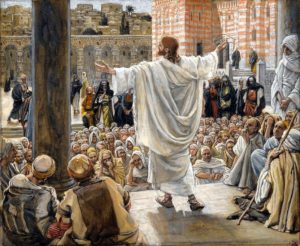 This is the third part of a six-part series about an imaginary journey to an Episcopal seminary where I ask hard questions about Christianity and priesthood. Without twenty-first century answers, I may have to drop out. You can find Part 1 here and Part 2 here.
This is the third part of a six-part series about an imaginary journey to an Episcopal seminary where I ask hard questions about Christianity and priesthood. Without twenty-first century answers, I may have to drop out. You can find Part 1 here and Part 2 here.
I am attending my first New Testament class to learn about Jesus and his message. The first thing the professor tells the class is that we shall not be discussing the New Testament letters. That is annoying because I believe that Paul badly distorted the primary message of Jesus—agape.
The professor then tells us that he will only briefly review all the apocryphal material found in the Dead Sea Scrolls, the Nag Hammadi library, and other twentieth-century discoveries. Again, I am disappointed because as a future priest, I think clergypeople should be familiar with the Gospel of Mary, which indicates that Mary of Magdala and Jesus had an intimate relationship and maybe were married. I heard that this gospel also shows the important role women played in Jesus’s ministry. I wonder if the institutional church deliberately destroyed any material that didn’t keep Jesus celibate and women in their place.
I think it is time for clergypeople to teach the laity about these new findings that could radically change the direction of the church. I want my seminary training to help me do that without destroying the church.
I also want to discuss the Gospel of Judas, another of the newer findings, which claims that Judas did not betray Jesus and that story was made up to substantiate the Old Testament quote “Even my bosom friend . . . who ate of my bread, has lifted the heel against me” (Psalm 41:9). The traditional betrayal story destroyed Judas’s reputation forever. That’s not nice.
I ask my first question: “Do the Gospels tell us who the real Jesus is?”
“No,” the professor replies, “we have next to no facts about Jesus the man.”
I wonder aloud, “Is Jesus a fictional character? I once read that only about eighteen percent of what the Gospels say Jesus said is what he truly said.” I don’t ask where the rest came from.
Then this question pops into my mind: “Who was there taking notes when Jesus was speaking?” I already know the answer: no one.
The subject switches to oral tradition, or how stories were passed on by mouth for at least four to eight decades. I am reminded of that old parlor game Telephone, where one person whispers a rumor to another person, who whispers it to the next person and so on, and by the time the rumor is relayed to the last person, it doesn’t sound anything like the original. Did this happen with oral tradition? Did the real story eventually become a fairy tale?
Then someone brings up the Nativity stories: “Are either of them true? They are so different!” I know neither story matches twenty-first-century reality. Could they be metaphors?
Interestingly, a fellow student shares that he had read that both stories were invented to dispel the rumor that Jesus was illegitimate. He says that the Roman historian Josephus even names the Roman soldier who impregnated Jesus’s mother Mary, suggesting both tales were invented to disguise the fact that Mary was raped.
I then wondered about the Resurrection stories. Jesus died a criminal. Were the Resurrection stories invented to expunge Jesus’s record?
I love this class because we students could discuss the truth. Then I wonder what would happen if the people in the pews heard the truth. Would the church fall apart?
The interesting thing is that learning all these new truths doesn’t affect my faith an iota. Jesus is still my Christ. Agape is still my daily job.
My next class is about the New Testament letters. I can’t wait to talk about Paul!
Image is in the public domain courtesy of Siembra Conmigo